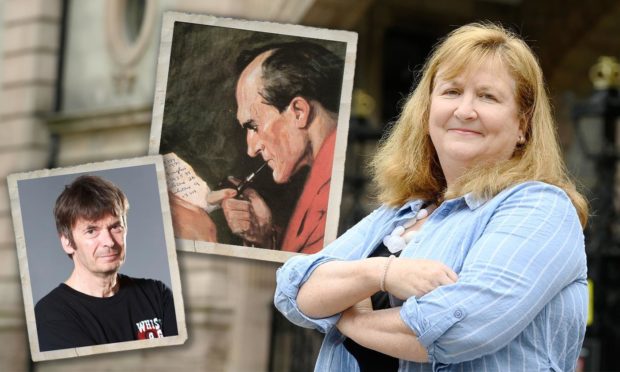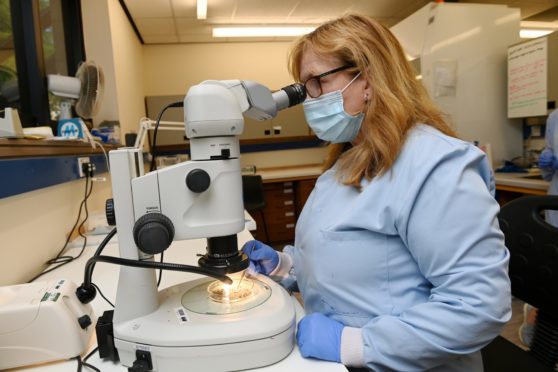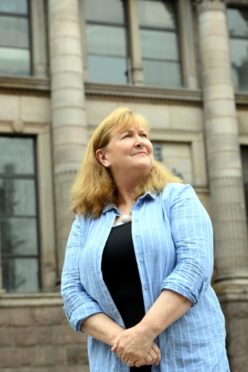Aberdeen’s scientific super-sleuth became fascinated with solving mysteries by reading Sherlock Holmes stories as a child.
And now, Professor Lorna Dawson’s career has come full circle after being immortalised in fiction herself by top Scottish author Ian Rankin.
Lorna, who was awarded a CBE in 2018, is the head of forensic soil science at the James Hutton Institute and lectures at Robert Gordon University.
Over the decades, her expertise in digging up vital evidence from crime scenes has been called upon to help solve some very high-profile cases.
In 2014, Lorna and her team of scientists helped convict Angus Sinclair for the World’s End murders committed in Edinburgh in 1977.
And soil samples they took from tools in a garden shed helped catch Swindon double-murderer Christopher Halliwell.
‘There was blood dripping into the soil’
Lorna is now preparing a talk on her life’s work for the inaugural Tedx event at Aberdeen Arts Centre next Saturday.
We were invited along for a preview of the engrossing 13-minute mini-lecture.
During the speech, Lorna will tell a socially-distanced audience of 100 people how the world’s most famous fictional detective inspired her career path.
She grew up on a farm in Angus and explained how breaking her leg in two places while picking potatoes at the age of 10 changed her life.
She said: “There was blood dripping into the soil, and I drifted in and out of consciousness.
“When I was recovering at home in a full leg plaster, I wasn’t able to go and climb trees or run about outside.
“I started reading interesting books, and one of my favourite authors was Arthur Conan Doyle – who wrote Sherlock Holmes.”
Lorna outlined how, in an 1890 story, the author tackled the subject of soil science long before it was a recognised part of the criminal justice system.
She added: “In The Sign of the Four, Holmes predicts the actual street where a person had walked by the colour of mud on the man’s shoes.
“He established the principle of tracking where someone had been from soil, that you can tell where it has come from by looking at the colour and consistency of that material.”
Pioneering work caught the eye Scottish crime-writing maestro
Speaking after the rehearsal, Lorna told us that the works of Agatha Christie were also an early inspiration.
She has since offered some important guidance to the UK’s most popular crime writers.
And her crowning glory came in 2018 when Ian Rankin based a character on her.
“It was those stories that got me interested in crime and solving mysteries”, the professor told us.
“And now I am working with crime authors.
“I advised Anne Cleeves for the Shetland series, and for an episode of Vera, and have helped with episodes of Silent Witness.
“Ian Rankin’s book In a House of Lies features myself as Professor Lee-Anne Inglis, who helps out in one of the cases.
“It’s strange to think that, not only am I now working with the type of people who got me into all this, but I’ve been turned into a fictional character myself.”
A Twitter exchange between Lorna and Ian Rankin after she discovered the homage –
Ah you spotted that, Lorna…
— Ian Rankin (@Beathhigh) October 29, 2018
Muddy spade provided clues on buried drugs stash
Lorna’s talk goes on to cover the harrowing experience of living in Edinburgh as a student at the time of the World’s End murders.
She also discusses the importance of science in the Jill Dando prosecution, and how it was used to secure a flimsy conviction that was later overturned.
Dando’s death remains unsolved, but Lorna is hopeful that continuing progress could provide new answers in such cold cases.
Lorna will also tell the crowd about how a dirty spade brought to her north-east lab by the police more than 20 years ago helped dig up some very important clues.
She said: “They thought people had used the spade to bury drugs somewhere, and wondered if we could tell where they might be through the soil on it.
“We managed to trace it to woodland at Countesswells, just outside Aberdeen.
“When police went there, they found the drugs.
“Forensic science can help provide the answer for where something came from, with methods that are defendable in court.”
Lorna is one of 10 expert speakers who have been selected from a field of 100 candidates for the TEDx Aberdeen event on Saturday, July 31.
Public speaking experts were putting the group through their paces at the ONE base on Schoolhill this week, and praised the professor on her “contagious enthusiasm and masterful delivery”.
The one-day community conference has been organised and curated by a team of volunteers from the city’s Vanguard movement.
Though tickets have already all been snapped up, the speeches will be available to view on Youtube. More information is available on the event’s website.
TED is a non-profit organisation devoted to spreading ideas, usually in the form of short but powerful talks.
The initiative began in 1984 as a conference where Technology, Entertainment and Design converged, and today its TED Talks app covers almost all topics –from science to business to global issues – in more than 100 languages.


